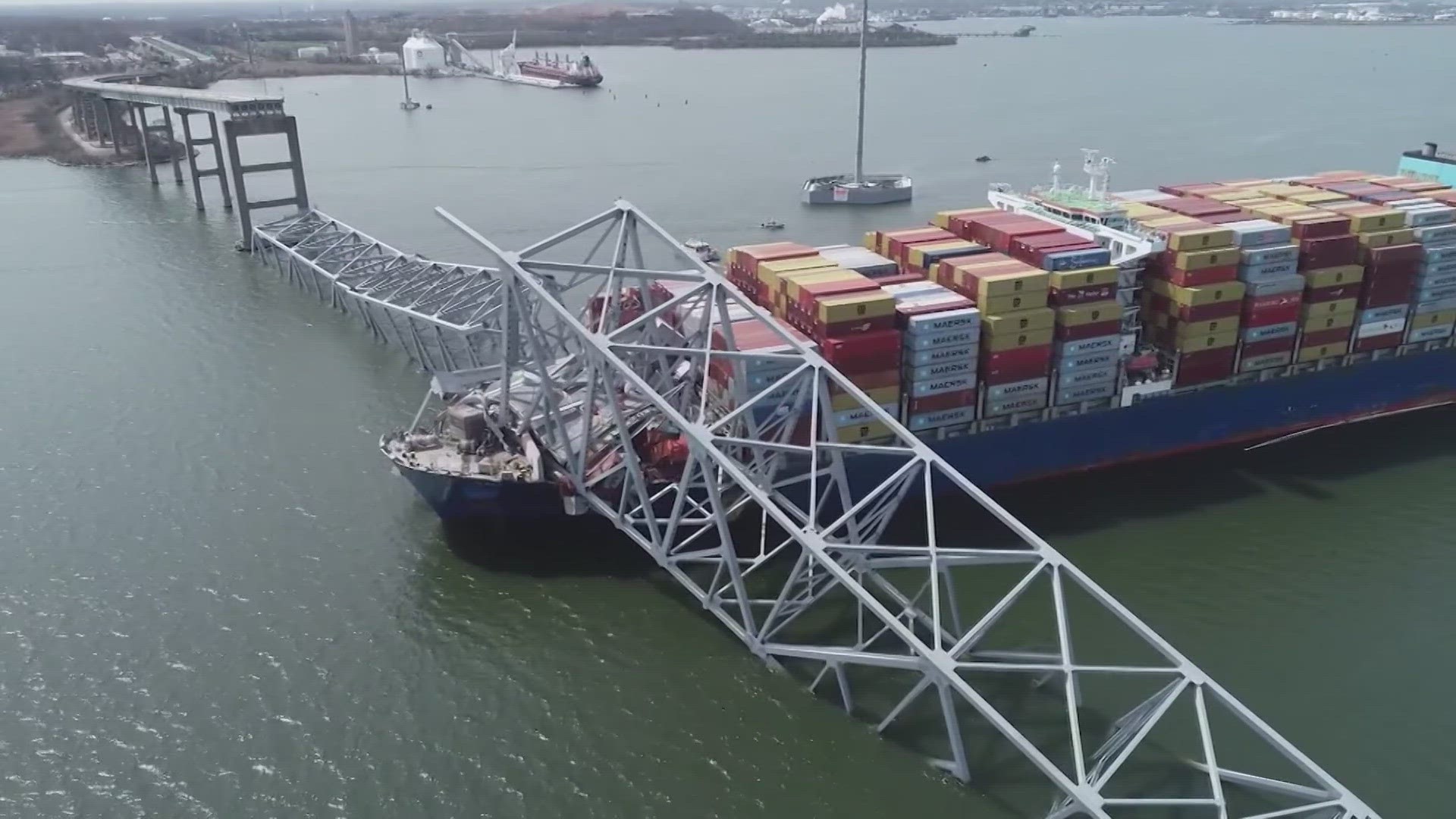WASHINGTON — A day after the Francis Scott Key Bridge collapsed, search and rescue efforts transitioned into a recovery mission. While that mission remains underway after two bodies were found, there are now efforts to reopen the channel, which acts as a major shipping port.
The bridge collapsed early Tuesday morning after a cargo ship, named the Dali, crashed into it. The bridge collapse has closed the port indefinitely, throwing people who work there in limbo.
The Port of Baltimore remains closed as vessels carrying cargo are forced to move to other ports on the East Coast. Some car companies and Carnival Cruises already announced plans to move their operations elsewhere for now.
Billions of dollars of goods typically come through the port each year, the biggest product being cars. Currently, there are about a dozen ships still stuck near the port because of the bridge collapse.
What's usually a bustling Port of Baltimore has trickled to little activity with the existing containers.
However, one former port director is confident the shipping channel will reopen sooner rather than later.
"It's a resilient city," said William Doyle, CEO, Dredging Contractors of America. "These people are very resilient and with everybody working together, it will happen relatively fast."
Following the collapse, Doyle quickly mobilized dredging companies and equipment to assist in removing the debris. He says to expect steel to move this week and large machinery, like 500-ton crane barges, to arrive.
"It's going to happen quicker than most people would probably expect because there's equipment on site right now," he said.
U.S. Secretary of Transportation Pete Buttigieg said reopening the port and clearing the channel is a different matter from rebuilding the bridge, but it is still no simple thing.
"I would expect that can happen on a much quicker timeline than the full reconstruction of the bridge so just asking teams the same question but I don't wanna put something out just yet weeks, months, years," Buttigieg said, ending with a shrug.
There's still the main question of how big an impact will this have on the economy. The Port of Baltimore generates more than 15,000 jobs and receives $80 billion of foreign goods. It's the biggest handler of car shipments in the country and moves many raw materials.
For now, vessels are forced to move to other ports on the East Coast.
"What I think you're going to see is that cargo will be unloaded in some of the ports before it gets to Baltimore and then it will be railed or trucked around so you're going to see the goods come into the United States," Doyle explained.
While there may be delays, Doyle seems confident that not only will we avoid major supply issues, but drastic price increases as well.
"We've learned some lessons from COVID," he added. "There's a lot of extra product in the market right now so I don't see prices going up."
Engineers will have to determine if and where to cut pieces of the bridge. It's not just the bridge, but they'll have to remove the 4,700 containers on the Dali carrying a variety of items.
Do you have a news tip on this story or any other story? We want to hear from you. Tell us about it by emailing newstips@wusa9.com.
MORE WAYS TO GET WUSA9
DOWNLOAD THE WUSA9 APP
Apple App Store: WUSA9 News on Apple
Google Play Store: WUSA9 News on Android
HOW TO ADD THE FREE WUSA9+ APP TO YOUR STREAMING DEVICE
ROKU: add the channel from the ROKU store or by searching for WUSA9.
For both Apple TV and Fire TV, search for "WUSA9" to find the free app to add to your account. Another option for Fire TV is to have the app delivered directly to your Fire TV through Amazon.
SIGN UP TO RECEIVE WUSA9 NEWSLETTER
Subscribe to our daily WUSA9 Newsletter for top stories from WUSA9 curated daily just for you. Get content and information right now for can’t-miss stories, Commanders content, weather, and more delivered right to your inbox.

